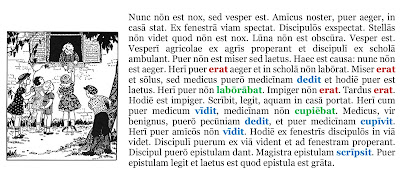All the Pliny the Elder quotations are from Naturalis Historia
https://www.attalus.org/info/pliny_hn.html
1st
declension
ananāsa, -ae [1/f]: (New Latin) pineapple; the origin
could be directly from Portuguese ananás or via Spanish; other forms of
the word exist: ananās [f] as an indeclinable noun
https://neolatinlexicon.org/latin/pineapple/
mūsa, -ae [1/f]: banana (see post 18.08.24)
palmula, -ae [1/f] -ul- is use to create a diminutive
i.e. it makes the word ‘smaller’; palma, -ae [1/f] [i] palm of the hand [ii]
palm tree > palmula: the fruit of the palm tree i.e. date
ūva, -ae [1/f]: grape
2nd declension
cerasus, -ī [2/f] or cerasum, -ī [2/n]: cherry
(tree or fruit)
mangus, -ī [2/m]: (New Latin) mango
aurantium, -ī [2/n]: orange tree from aurantius,
-a, -um: orange coloured; both are Late Latin
sūcus, -ī [2/m] or succus, -ī [2/m] aurantiī: orange juice
Wiktionary gives the detailed etymology of words, tracing
their origin as far back as possible but [image] https://latin-dictionary.net/ also
gives a brief summary of when the word first appeared and how common it is:
citreum, -ī [2/n]: citron tree; fruit of the citron
tree i.e. lemon
Cupressinum oleum eōsdem effectūs habet quōs myrteum, item citreum.
(Pliny the Elder) │ Oil of cypress has the same effects as oil of myrtle and as
oil of citrus.
frāgum, -ī [2/n]: strawberry plant; plur. frāga,
-ōrum: strawberries
Quī legitis flōrēs et humī nāscentia frāga, /
frīgidus, ō puerī (fugite hinc!), latet anguis in herbā. (Vergil)
“You, picking flowers and strawberries that grow / so
near the ground, fly hence, boys, get you gone! / There's a cold adder lurking
in the grass.”
____________________
Three ways of eating pomegranates?
[i] grānātum, -ī [2/n]
Sed circā Carthāginem Pūnicum mālum cognōmine sibi vindicat;
aliquī grānātum appellant. (Pliny the Elder) │ But the country in the
neighbourhood of Carthage claims by the name of Punic apple (see [iii] below)
what some call the pomegranate
[ii] apȳrēnum, -ī [2/n]
Pliny the Elder continues:
dīvīsit et in genera apȳrēnum vocandō cui lignōsus
nucleus abesset │ this it has also split up into classes, by giving the name of
apyrenum to the variety that lacks a woody kernel
[iii] mālum pūnicum (Punic apple) which Pliny the
Elder refers to in [i] above as being an alternative name
From Cato De Agricultura:
inde bienniō post effoditō seritōque. Fīcum, oleam, mālum
Pūnicum, cotoneum aliaque māla omnia, … │ Then two years later dig up and
transplant them. Fig, olive, pomegranate, quince, and all other fruit
trees, …
Note also from the same extract:
fīcus, -ūs [4th decl.] or fīcus, -ī
[2nd decl.]; the word could be masculine or feminine: fig (fruit or
tree)
olea, -ae [1/f]: olive (tree or fruit) or olīva, -ae [1/f]
cotōneum, -ī [2/n] or mālum cotōneum (“Cydonian apple”):
quince
____________________
kivium, -ī [2/n]: kiwi (from Maori); the Romans
didn’t have them, but the Latin language does:
https://neolatinlexicon.org/latin/kiwi/
lycopersicum, -ī [2/n]: tomato; this is a good
example of scholarly or scientific vocabulary since the species originated in
Central and South America and was introduced to other European colonies in the
16th century
The word is derived from Anc. Gk. λύκος / lúkos: “wolf” + περσικών / persikṓn “peach”; if you’re scared of
wolves, you suffer from lycophobia. If you’re a lycanthrope, then you
tend rapidly to grow body hair and howl a lot during a full moon.
mālum, -ī [2/n]: apple
mālum persicum: (“Persian apple”) peach; persicus, -ī
[2/f]: peach tree
pirum, -ī [2/n]: pear
pōmum, -ī [2/n]: note - this can refer to any type of fruit i.e. don't be influenced by Fr. pomme (apple)
stābat adhūc dūrīs fīcus dēnsissima pōmīs (Ovid) │ There stood a fig-tree, still loaded with unripe fruit.
prūnum, -ī [2/n]: plum
vaccīnium, -ī [2/n]: blueberry; the term in English
refers to a genus of plants that include cranberries, blueberries and
whortleberries (bilberries)
Nōn nisi in aquōsīs prōveniunt salicēs, alnī, populī, siler,
ligustra …, item vaccīnia Ītaliae in aucupiīs sata, Galliae vērō
etiam purpurae tinguendae causā ad servitiōrum vestēs. (Pliny the Elder) │ Willows,
alders, poplars, the siler and the privet, …, will only grow in places where
there is water, and the same is the case with the whortleberry, grown in
bird-snares in Italy, but in Gaul also to supply purple dye for slaves'
clothes.
When doing this kind of work, you can sometimes become
side-tracked.
Apart from the reference to the fruit, I was also interested
in the remark concerning the use of purple dye for slaves’ clothes in Gaul,
something that I’d never read before. While Pliny isn’t referring to the
expensive Tyrian purple dye used for the great and good of Rome, the colour
purple itself does not always appear to have been the exclusive domain of the
upper echelons of society.
3rd declension
mēlō, mēlōnis [3/m]: (Late Latin) melon; possibly a shortening of mēlopepō, mēlopepōnis [3/m]: "an apple-shaped melon" (Lewis and Short)
4th declension
fīcus, -ūs [4 m/f]: fig (see earlier note)
Where it all started …
fructus, -ūs [4/m] fruit

































